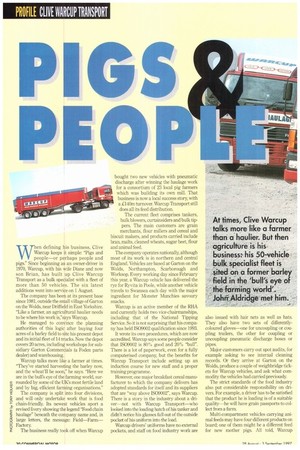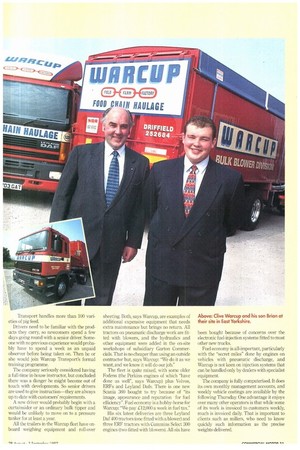W en defining his business, Clive Warcup keeps it simple: "Pigs
Page 32

Page 33

If you've noticed an error in this article please click here to report it so we can fix it.
and people—or perhaps people and pigs." Since beginning as an owner-driver in 1970, Warcup, with his wife Diane and now son Brian, has built up Clive Warcup Transport as a bulk specialist with a fleet of more than 50 vehicles. The six latest additions went into service on 1 August.
The company has been at its present base since 1981, outside the small village of Garton on the Wolds, near Driffield in East Yorkshire. "Like a farmer, an agricultural haulier needs to be where his work is,"says Warcup.
He managed to convince the planning authorities of this logic after buying four acres of a barley field to site his present depot and its initial fleet of 14 trucks. Now the depot covers 20 acres, including workshops for subsidiary Garton Commercials (a Foden parts dealer) and warehousing.
Warcup talks more like a farmer at times. "They've started harvesting the barley now, and the wheat'll be soon," he says. "Here we are in the bull's eye of the farming world, surrounded by some of the UK's most fertile land and by big, efficient farming organisations."
The company is split into four divisions, and will only undertake work that is food chain-friendly. Its newest vehicles sport a revised livery showing the legend "Food chain haulage" beneath the company name and, in large letters, the message: Field—FarmFactory.
The business really took off when Warcup bought two new vehicles with pneumatic discharge after winning the haulage work for a consortium of 23 local pig farmers which was building its own mill. That business is now a local success story, with a £140m turnover. Warcup Transport still does all its feed distribution.
The current fleet comprises tankers, bulk blowers, curtainsiders and bulk tippers. The main customers are grain merchants, flour millers and cereal and biscuit makers, and products carried include bran, malts, cleaned wheats, sugar beet, flour and animal feed.
The company operates nationally, although most of its work is in northern and central England. Vehicles are based at Garton on the Wolds, Northampton, Scarborough and Worksop. Every working day since February this year, a Warcup vehicle has delivered the rye for Ryvita in Poole, while another vehicle travels to Swansea each day with the major ingredient for Monster Munchies savoury snacks.
Warcup is an active member of the RHA and currently holds two vice-chairmanships, including that of the National Tipping Service. So it is not surprising that his company has held IS09002 qualification since 1993. It wrote its own procedures, which are now accredited. Warcup says some people consider that 1509002 is 80% good and 20% "bull". There is a lot of paperwork, even for a fully computerised company, but the benefits for Warcup Transport include setting up an induction course for new staff and a proper training programme.
However, one major breakfast cereal manufacturer to which the company delivers has adopted standards for itself and its suppliers that are "way above IS09002", says Warcup. There is a story in the industry about a driver—not with Warcup Transport—who looked into the loading hatch of his tanker and didn't notice his glasses fall out of the outside pocket of his uniform into the load.
Warcup drivers' uniforms have no external pockets, and staff on food industry work are also issued with hair nets as well as hats, They also have two sets of differentlycoloured gloves—one for uncoupling or coupling trailers, the other for coupling or uncoupling pneumatic discharge hoses or pipes.
Major customers carry out spot audits, for example asking to see internal cleaning records. Or they arrive at Garton on the Wolds, produce a couple of weighbridge tickets for Warcup vehicles, and ask what commodity the vehicles had carried previously.
The strict standards of the food industry also put considerable responsibility on drivers. For example, a driver has to be satisfied that the product he is loading is of a suitable quality—he will have grain passports to collect from a farm.
Multi-compartment vehicles carrying animal feeds may have four different products on board; one of them might be a different feed for new mother pigs. All told, Warcup Transport handles more than 100 varieties of pig feed.
Drivers need to be familiar with the products they carry, so newcomers spend a few days going round with a senior driver. Someone with no previous experience would probably have to spend a week as an unpaid observer before being taken on. Then he or she would join Warcup Transport's formal training programme.
The company seriously considered having a full-time in-house instructor, but concluded there was a danger he might become out of touch with developments. So senior drivers are used to give instruction—they are always up to date with customers' requirements.
A new driver would probably begin with a curtainsider or an ordinary bulk tipper and would be unlikely to move on to a pressure tanker for at least a year.
All the trailers in the Warcup fleet have onboard weighing equipment and roll-over sheeting. Both, says Warcup, are examples of additional expensive equipment that needs extra maintenance but brings no return. All tractors on pneumatic discharge work are fitted with blowers, and the hydraulics and other equipment were added in the on-site workshops of subsidiary Garton Commercials. That is no cheaper than using an outside contractor but, says Warcup: "We do it as we want, and we know it will do our job."
The fleet is quite mixed, with some older Fodens (the Perkins engines of which "have done us well", says Warcup) plus Volvos, ERFs and Leyland Dafs. There is one new Scania 360 bought to try because of "its image, appearance and reputation for fuel efficiency". Fuel economy is a hobby-horse for Warcup: "We pay £12,000 a week in fuel tax."
His six latest deliveries are three Leyland Daf 400 tractors (one fitted with a blower) and three ERF tractors with Cummins Select 300 engines (two fitted with blowers). All six have been bought because of concerns over the electronic fuel-injection systems fitted to most other new trucks.
Fuel economy is all-important, particularly with the "secret miles" done by engines on vehicles with pneumatic discharge, and Warcup is not keen on injection systems that can be handled only by dealers with specialist equipment.
The company is fully computerised. It does its own monthly management accounts, and weekly vehicle costings are available by the following Thursday. One advantage it enjoys over many other operators is that while some of its work is invoiced to customers weekly, much is invoiced daily. That is important to clients such as millers, who need to know quickly such information as the precise weight; delivered.
































































































